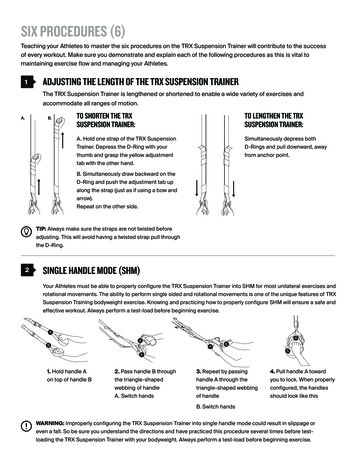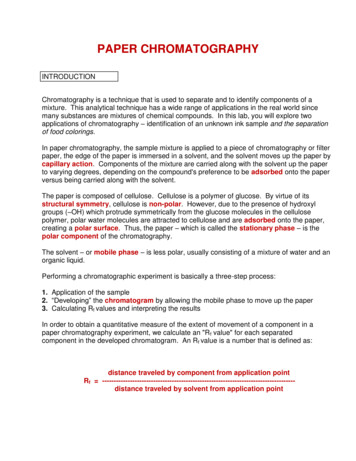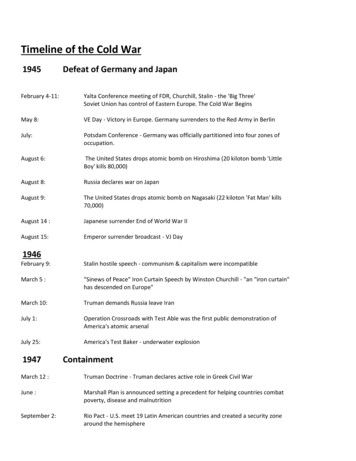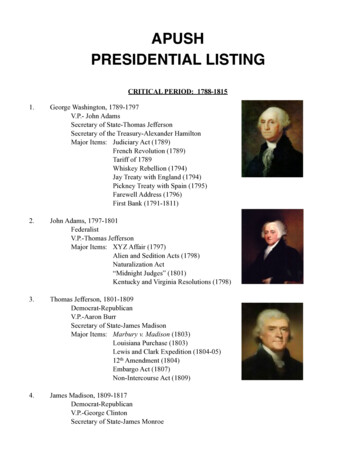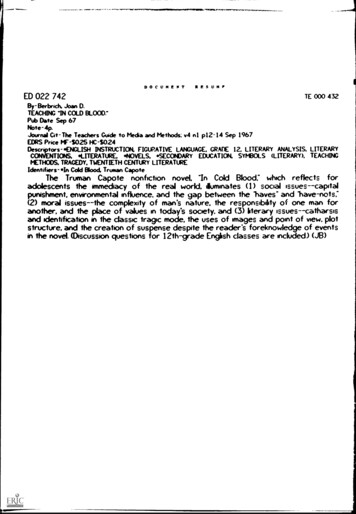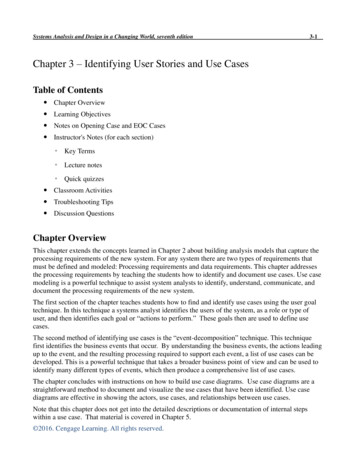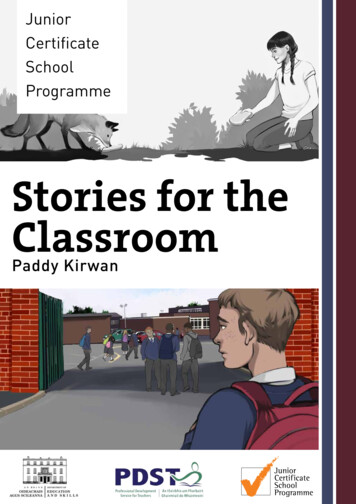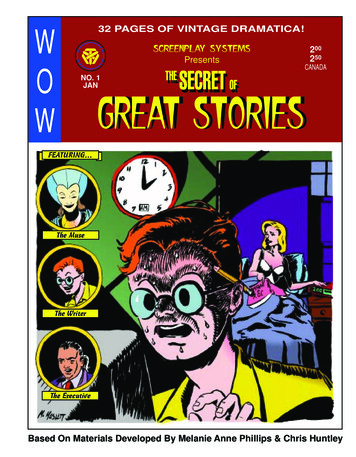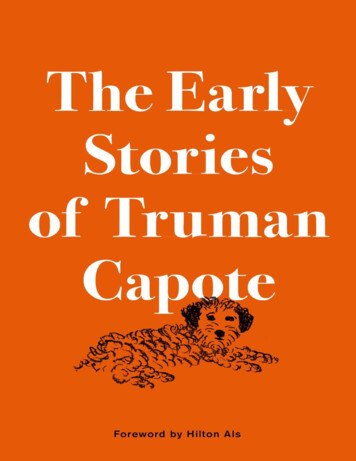
Transcription
The Early Stories of Truman Capote is a work of fiction. Names, characters, places, and incidentsare the products of the author’s imagination or are used fictitiously. Any resemblance to actualevents, locales, or persons, living or dead, is entirely coincidental.Copyright 2015 by The Truman Capote Literary TrustForeword copyright 2015 by Hilton AlsAfterword copyright 2015 by Penguin Random House LLCBiographical note copyright 1993 by Penguin Random House LLCAll rights reserved.Published in the United States by Random House, an imprint and division of Random House LLC,a Penguin Random House Company, New York.RANDOM HOUSE and the HOUSE colophon are registered trademarks of Penguin RandomHouse LLC.The following stories were originally published in The Green Witch: “Parting of the Way” (January1940); “Swamp Terror” (June 1940); “The Moth in the Flame” (December 1940); “Miss BelleRankin” (December 1941); “Hilda,” “Louise,” and “Lucy” (all May 1941). The following storiesappeared in German in Zeit in 2013: “Swamp Terror,” “Miss Belle Rankin,” and “This Is forJamie.”Library of Congress Cataloging-in-Publication DataCapote, Truman, 1924–1984.[Short stories. Selections]The early stories of Truman Capote/Truman Capote; foreword by Hilton Als.pages cmISBN 978-0-8129-9822-1eBook ISBN 978-0-8129-9823-8I. Title.PS3505.A59A6 2015813'.54—dc232015011437eBook ISBN 9780812998238randomhousebooks.comBook design by Susan Turner, adapted for eBookCover design and illustration: Eric Whitev4.1ep
ContentsCoverTitle PageCopyrightForeword by Hilton AlsParting of the WayMill StoreHildaMiss Belle RankinIf I Forget YouThe Moth in the FlameSwamp TerrorThe Familiar StrangerLouiseThis Is for JamieLucyTraffic WestKindred SpiritsWhere the World BeginsAfterwordBooks by Truman CapoteBiographical NoteAbout the Truman Capote Literary Trust
Forewordby Hilton AlsTruman Capote stands in the middle of his motel room watching the TV.The motel is in the middle of the country—Kansas. It’s 1963. The crummycarpet beneath his feet is stiff but it’s the stiffness that helps hold him up—especially if he’s had too much to drink. Outside, the western windblows and Truman Capote, a glass of scotch in hand, watches the TV. It’sone way he gets to relax after a long day in Garden City or its environs ashe researches and writes In Cold Blood, his nonfiction novel about amultiple murder and its consequences. Capote began the book in 1959,but at first it wasn’t a book; it was a magazine article for The New Yorker.As originally conceived by the author, the piece was meant to describe asmall community and its response to a killing. But by the time he arrivedin Garden City—the murders had been committed in nearby Holcomb—Perry Smith and Richard Hickock had been arrested and charged withslaying farm owners Mr. and Mrs. Herbert Klutter and their youngchildren, Nancy and Kenyon; as a consequence of that arrest, Capote’sproject shifted focus, got more involved. On this particular late afternoon,though, In Cold Blood was about two years away from being finished. It’s1963, and Truman Capote stands in front of the TV. He’s almost forty andhe’s been a writer for nearly as long as he’s been alive. Words, stories,tales—he’s been at it since he was a child, growing up in Louisiana andrural Alabama and then Connecticut and New York—a citizen formed by adivided world and opposing cultures: in his native South there wassegregation, and, up north, at least talk of assimilation. In both placesthere was his intractable queerness. And the queerness of being a writer.“I started writing when I was eight,” Capote said, once. “Out of the blue,uninspired by any example. I’d never known anyone who wrote; indeed, Iknew few people who read.” Writing, then, was his, just as his gayness—or, more specifically, his observant, critical, amused homosexual
sensibility—was his, too. One would serve the other. “The mostinteresting writing I did during those days,” Capote wrote of hiswunderkind years, “was the plain everyday observations that I recordedin my journal. Descriptions of a neighbor .Local gossip. A kind ofreporting, a style of ‘seeing’ and ‘hearing’ that would later seriouslyinfluence me, though I was unaware of it then, for all my ‘formal’ writing,the stuff that I published and carefully typed, was more or less fictional.”And yet it is the reportorial voice in Capote’s early short stories, herecollected for the first time, that remains among the work’s more poignantfeatures—along with his careful depiction of difference. From “Miss BelleRankin,” a story about misfits in a small southern town, written whenCapote was seventeen:I was eight the first time I saw Miss Belle Rankin. It was a hotAugust day. The sun was waning in the scarlet-streaked sky,and the heat was rising dry and vibrant from the earth.I sat on the steps of the front porch, watching anapproaching negress, and wondered how she could ever carrysuch a huge bundle of laundry on top of her head. Shestopped and in reply to my greeting, laughed, that dark,drawling negro laughter. It was then that Miss Belle camewalking slowly down the opposite side of the street .I saw her many times afterwards, but that first vision,almost like a dream, will always remain the clearest—MissBelle, walking soundlessly down the street, little clouds of reddust rising about her feet as she disappeared into the dusk.We will return to that Negress and Capote’s relationship to blacknessthroughout the early part of his career in a moment. For now, let’s treatthis Negress as a real figment of the author’s time and place of origin, akind of painful literary artifact or black “shadow,” as Toni Morrison hasit, who took many forms in novels by white Depression-era heavy hitterssuch as Hemingway and Faulkner and Capote’s much-admired WillaCather. When she appears in “Miss Belle Rankin,” Capote’s clearlydifferent narrator distances himself from her by calling attention to her“drawling negro laughter,” and being easily spooked: at least whiteness
saves him from that. 1941’s “Lucy” is told from another young maleprotagonist’s point of view. This time, though, he’s looking to identifywith a black woman who’s treated as property. Capote writes: “Lucy wasreally the outgrowth of my mother’s love for southern cooking. I wasspending the summer in the south when my mother wrote my aunt andasked her to find her a colored woman who could really cook and wouldbe willing to come to New York. After canvassing the territory, Lucy wasthe result.” Lucy is lively, and loves show business as much as her youngwhite companion does. As a matter of fact, she loves to imitate thosesingers—Ethel Waters among them—who delights them both. But is Lucy—and maybe Ethel?—performing a kind of female Negro behavior that’sdelightful because it’s familiar? Lucy is never herself because Capote doesnot give her a self. Still, there is yearning for some kind of character, asoul and body to go along with what the young writer is really examining,which also happens to be one of his great themes: outsiderness. Morethan Lucy’s race there is her southerness in a cold climate—a climate thatthe narrator, clearly a lonely boy the way Capote, the only child of analcoholic mother, was a lonely boy, identifies with. Still, Lucy’s creatorcannot make her real because his own feelings of difference are not real tohimself—he wants to get a handle on them. (In his 1979 story Capotewrites of his 1932 self: “I had a secret, something that was bothering me,something that was really worrying me very much, something I wasafraid to tell anybody, anybody—I couldn’t imagine what their reactionwould be, it was such an odd thing that was worrying me, that had beenworrying me for almost two years.” Capote wanted to be a girl. And afterhe confesses it to someone he thinks might help him achieve that goal,she laughs.) In “Lucy” and elsewhere, sentiment caulks his sharp, originalvision; Lucy belongs to Capote’s desire to belong to a community, bothliterary and actual: when he wrote the piece he could not give up thewhite world just yet; he could not forsake the majority for the isolationthat comes with being an artist. “Traffic West” was a step in the rightdirection or a preview of his mature style. Composed of a series of shortscenes, the piece is a kind of mystery story about faith and the law. Itbegins:Four chairs and a table. On the table, paper—in the chairs,men. Windows above the street. On the street, people—
against the window, rain. This was, perhaps, an abstraction, apainted picture only, but the people, innocent, unsuspecting,moved below, and the the rain fell wet on the window. For themen stirred not, the legal, precise document, on the tablemoved not.Capote’s cinematic eye—the movies influenced him as much as booksand conversation did—was sharpened as he produced these apprenticeworks, and their value, essentially, is watching where pieces like “TrafficWest” led him, technically speaking. Certainly that story was theapprentice work he needed to write to get to “Miriam,” an amazing taleabout a disenfranchised older woman living in an alienating New Yorkcovered in snow. (Capote published “Miriam” when he was just twenty.)And, of course, stories like “Miriam” led to other cinema-inspirednarratives like 1950’s “A Diamond Guitar,” which, in turn, presages thethemes Capote explored so brilliantly in In Cold Blood, and in his 1979piece “Then It All Came Down,” about Charles Manson’s associate BobbyBeausoleil. On and on. By writing and working through, Capote, thespiritual waif as a child with no real fixed address, found his focus,or perhaps, mission: to articulate all that which his circumstances andsociety had hitherto not described, especially transience, and thosemoments of heterosexual love or closeted, silent homoeroticism, thatsealed people off, one from the other. In the intermittenly touching “If IForget You,” a woman waits for love, or love’s illusions, despite the realityof a situation. The piece is subjective; thwarted love always is. Capotefurther explores missed chances and forsaken love from a woman’s pointof view in “The Familiar Stranger.” In it an elderly white woman namedNannie dreams she has a male visitor who is at once solicitous andmenacing in the way that sex can sometimes feel. Like the first-personnarrator in Katherine Anne Porter’s masterly 1930 story “The Jilting ofGranny Weatherall,” Nannie’s hardness—her voice of complaint—is theresult of having been rejected, fooled by love, and the vulnerability itrequires. Nannie’s resulting skepticism spills out into the world—herworld, being, in sum, her black retainer, Beulah.Beulah is always there—supportive, sympathetic—and yet she has noface, no body: she is a feeling, not a person. Here again Capote fails histalent when it comes to race; Beulah is not a creation based on truth but
the fiction of race, what a black woman is, or stands for. Urgently we lookpast Beulah to other Capote works for his brilliant sense of reality infiction, that which gives the work its peculiar resonance. When Capotebegan publishing his nonfiction writing in the mid- to late 1940s, fictionwriters rarely if ever crossed over into journalism—it was considered alesser form, despite its importance to early masters of the English novel,such as Daniel DeFoe and Charles Dickens, both of whom had started offas reporters. (DeFoe’s vexing and profound Robinson Crusoe was partlyinspired by an explorer’s journal and Dickens’s 1853 masterpiece BleakHouse, alternates subjective first-person narration with third-personjournalistic-like reports about English law and society.) In short, it wasrare for a modern writer of fiction to give up its relative freedoms forjournalism’s strictures, but I think Capote always loved the tensioninherent in cheating the truth. He always wanted to elevate reality abovethe flatness of facts. (In his first novel, 1948’s Other Voices, Other Rooms,the book’s protagonist, Joel Harrison Knox, recognizes that impulse inhimself. When the black servant Missouri catches Joel in a lie, she says,“You is a gret big story.” Capote then goes on to write: “Somehow,spinning the tale, Joel had believed every word.”) Later, in 1972’s “SelfPortrait,” we have this:Q: Are you a truthful person?A: As a writer—yes, I think so. Privately—well, that is a matter ofopinion; some of my friends think that when relating an event or pieceof news, I am inclined to alter and overelaborate. Myself, I just call itmaking something “come alive.” In other words, a form of art. Art andtruth are not necessarily compatible bedfellows.In his wonderful early nonfiction books—1950’s Local Color and1956’s strange and hilarious The Muses Are Heard, which covers a troupeof black actors in communist-era Moscow performing Porgy and Bess,and the Russians’ sometimes-racist reaction to the performers—thewriter used factual events as a jumping-off point to aid in his musingsabout outsiders. Most of his subsequent nonfiction work would be aboutoutsiders, too—all those drifters and proles trying to make it in unfamiliarworlds. In “Swamp Terror” and “Mill Store,” both from the early 1940s,
the backwoods worlds Capote draws are political in shape. Each tale takesplace in worlds limited by machismo and poverty and the confusion andshame that each can bring about. These pieces are the “shadow” of OtherVoices, Other Rooms, which can best be read as a report from theemotional and racial terrain that helped form him. (Capote said that thebook ended the first phase of his life as a writer. It is also a landmark in“out” literature. Essentially the novel asks what’s different. In one sceneKnox listens as a young girl goes on and on about her butch sister’s desireto be a farmer. “What’s wrong with that?” Joel asks. Indeed, what iswrong with that? Or any of it?) In Other Voices, Other Rooms, a work ofhigh southern gothic symbolism and drama, we meet Missouri, or Zoo, asshe is sometimes called. Unlike her literary predecessors she is notcontent to live in the shadows while emptying bedpans and listening toquarrelsome white folk in Capote’s house of the sick. But Zoo can’t breakfree; she’s stopped in freedom’s tracks by the machismo, ignorance, andbrutality the author vividly describes in “Swamp Terror” and “Mill Store”:After Zoo runs off, she’s forced to return to her former life. There, Joelasks her if she managed to make it up north and see snow. Zoo shouts:“There ain’t none. Hit’s all a lotta foolery, snow and such: that sin! It’severywhere! Is a nigger sun, an my soul, it’s black.” She’s been rapedand burned and her attackers were white. Despite the fact that Capotesaid he was not a political person (“I’ve never voted. Though, if invited, Isuppose I might join almost anyone’s protest parade: Antiwar, FreeAngela, Gay Liberation, Ladie’s Lib, etc.”), politics was always part of hislife because his soul was queer and he had to survive, which means beingaware of how to use your difference, and why. As an artist, TrumanCapote treated truth as a metaphor he could hide behind, the better toexpose himself in a world not exactly congenial to a southern-born queenwith a high voice who once said to a disapproving truck driver: “What areyou looking at? I wouldn’t kiss you for a dollar.” So doing, he gave hisreaders, queer and not queer, license to imagine his real self in a realsituation—in Kansas, researching In Cold Blood—while watching the TVbecause it’s interesting to think about him maybe taking in news reportsfrom the time, like that story about those four black girls in Alabama, oneof his home states, blown to bits in a church by racism and maleficence,and maybe wondering how, as the author of 1958’s Breakfast at Tiffany’s,he could have written of Holly Golightly, the book’s star, asking for a
cigarette and then saying: “I don’t mean you, O.J. You’re such a slob. Youalways nigger-lip.” Capote’s best fiction is true to his queerness and it’sweakest when he fails to throw off the mores of the only gay male modelhe probably knew when he was growing up in Louisiana and Alabama: amelancholy, arch, mired-in-nostalgia-and-honeysuckle queen namedCousin Randolph, who “understands” Zoo because her reality doesn’tinterfere with his narcissism—at least he wasn’t that. By writing in and ofhis times, Capote transcended both by becoming an artist, one whopresaged our time by delineating the truth to be had in fabrication.HILTON ALS is a staff writer for The New Yorker. His work also appears inThe New York Review of Books. He is the author of The Women andWhite Girls. He lives in New York.
Parting of the Way
Twilight had come; the lights from the distant town were beginning toflash on; up the hot and dusty road leading from the town came twofigures, one, a large and powerful man, the other, young and delicate.Jake’s flaming red hair framed his head, his eyebrows looked likehorns, his muscles bulged and were threatening; his overalls were fadedand ragged, and his toes stuck out through pieces of shoes. He turned tothe young boy walking beside him and said, “Guess this is just about timeto make camp for tonight. Here, kid, take this bundle and lay it overthere; then git some wood—and make it snappy too. I want to make thevittels before it’s all dark. We can’t have anybody seein’ us. Go on there,hurry up.”Tim obeyed the orders and set about gathering the wood. His thinshoulders drooped from the strain, and his gaunt features stood out withprotruding bones. His eyes were weak but sympathetic; his rose-budmouth puckered slightly as he went about his labor.Neatly he piled the wood while Jake cut strips of bacon and put themin a grease-coated pan. Then, when the wood was ready to be fired, hesearched through his overalls for a match.“Damn it, where did I put those matches? Where are they, you ain’tgot ’em, have you, kid? Nuts, I didn’t think so; ah, here they are.” He drewa paper of matches from a pocket, lit one, and protected the tiny flamewith his rough hands.Tim put the pan with the bacon over the small fire that was rapidlycatching. The bacon remained still for a minute or so and then a tinycrackling sound started, and the bacon was frying. A very rancid odorcame from the meat. Tim’s sick face turned sicker from the fumes.“Gee, Jake, I don’t know whether I can eat any of this junk or not. Itdoesn’t look right to me. I think it’s rancid.”“You’ll eat it or nothin’. If you weren’t so stingy with that piece ofchange you got, we could a got us somethin’ decent to eat. Why, kid, yougot a whole ten bucks. It doesn’t take that much to get home on.”“Yes, it does, I’ve got it all figured out. The train fare will cost me fivebucks, and I want to get a new suit for about three bucks, then I want to
git Ma somethin’ pretty for about a dollar or so; and I figure my food willcost a buck. I want to git lookin’ decent. Ma an’ them don’t know I beenbummin’ around the country for the last two years; they think I’m atraveling salesman—that’s what I wrote them; they think I’m just cominghome now to stay a while afore I start out on a little trip somewhere.”“I ought to take that money off you—I’m mighty hungry—I mighttake that piece of change.”Tim stood up, defiant. His weak, frail body was a joke compared tothe bulging muscles of Jake. Jake looked at him and laughed. He leanedback against a tree and roared.“Ain’t you a pretty somethin’? I’d jes’ twist that mess of bones youcall yourself. Jes’ break every bone in your body, only you been prettygood for me—stealin’ stuff for me an’ the likes of that—so I’ll let you keepyour pin money.” He laughed again. Tim looked at him suspiciously andsat back down on a rock.Jake took two tin plates from a sack, put three strips of the rancidbacon on his plate and one on Tim’s. Tim looked at him.“Where is my other piece? There were four strips. You’re supposed toget two an’ me two. Where is my other piece?” he demanded.Jake looked at him. “I thought you said that you didn’t want any ofthis rancid meat.” Putting his hands on his hips he said the last eightwords in a high, sarcastic, feminine voice.Tim remembered, he had said that, but he was hungry, hungry andcold.“I don’t care. I want my other piece. I’m hungry. I could eat justabout anything. Come on, Jake, gimme my other piece.”Jake laughed and stuck all the three pieces in his mouth.Not another word was spoken. Tim went sulkily over in a corner,and, reaching out from where he was sitting, he gathered pine twigs,neatly laying them along the ground. Finally, when this job was finished,he could stand the strained silence no longer.“Sorry, Jake, you know how it is. I’m excited about getting home andeverything. I’m really very hungry too, but, gosh, I guess all there is to dois to tighten up my belt.”“The hell it is. You could take some of that jack you got and go get us
a decent meal. I know what you’re thinkin’. Why don’t we steal somefood? But hell, you don’t catch me stealin’ anything in this burg. I heardfrom buddies that this place,” he pointed a finger toward the lights thatindicated a town, “is one of the toughest little burgs this side of nowhere.They watch bums like eagles.”“I guess you’re right, but you understand, I just ain’t goin’ to take anychances on losin’ none of this dough. It’s got to last me, ’cause it’s all I gotan’ all I’m liable to get in the next few years. I wouldn’t disappoint Ma foranything in the world.”Morning came gloriously, the large orange disc known as the suncame up like a messenger from heaven over the distant horizon. Tim hadawakened just in time to see the sunrise.He shook Jake, who jumped up demanding: “What do you want? Oh!it’s time to get up. Hell, how I hate to get up.” Then he let out a mightyyawn and stretched his powerful arms as far as they would go.“This is shore goin’ to be one hot day, Jake. I shore am glad I ain’tgoin’ to have to walk. That is, only as far back into that town as therailroad station is.”“Yeh, kid. Think of me, I ain’t got any place to go, but I’m goin’ there,just walkin’ in the hot sun. I wish it would always be like early spring, nottoo hot, not too cold. I sweat to death in summer and freeze in winter. It’sa heck of a climate. I think I’d like to go to Florida in the winter, but thereain’t no good pickins there anymore.” He walked over and started to takeout the frying utensils again. He reached into the pack and brought out abucket.“Here, kid, go up there to that farm house about a quarter of a mileup the road and git some water.”Tim took the bucket and started up the road.“Hey, kid, ain’t you goin’ to take your jacket? Ain’t you afraid I’ll stealyour dough?”“Nope. I guess I can trust you.” But down deep in his heart he knewthat he couldn’t. The only reason he hadn’t turned back was because hedidn’t want Jake to know that he didn’t trust him. The chances were thatJake knew it anyway.Up the road he trudged. It was not paved, but even in the early
morning the dust still stuck. The white house was just a little bit farther.As he reached the gate, he saw the owner coming out of the cow shed witha pail in his hand.“Hey, Mister, can I please have this bucket filled with some water?”“I guess so. There’s the pump.” He pointed a dirty finger toward apump in the yard. Tim went in. He grasped the pump-handle and pushedit up and down. Suddenly the water came spilling out in a cold stream. Hereached down and stuck his mouth to the spout and let cold liquid run inand over his mouth. After filling the bucket he started back down theroad.He broke his way through the brush and came back into the clearing.Jake was bending over the bag.“Damn, they jes’ ain’t nothin’ left to eat. I thought, at least, therewere a couple of slices of that bacon left.”“Aw, that’s all right. When I get to town I can get me a whole meal—an’ maybe I’ll buy you a cup of coffee—an’ a bun.”“Gee, but you’re generous.” Jake looked at him disgustedly.Tim picked up his jacket and reached in the pocket. He brought out aworn leather wallet and unfastened the catch.“I’m about to produce the dough that’s goin’ to take me home.” Herepeated the words several times, caressing it each time.He reached into the wallet. He brought out his hand—empty. Anexpression of horror and unbelief overcame him. Wildly he tore the walletapart, then dashed about looking through the pine needles. Furiously heran around like a trapped animal—then he saw Jake. His small thin frameshook with fury. Wildly he turned on him.“Give me back my money, you thief, liar, you stole it from me. I’ll killyou if you don’t give it back. Give it back! I’ll kill you! You promised youwouldn’t take it. Thief, liar, cheat! Give it to me, or I’ll kill you.”Jake looked at him astounded and said, “Why, Tim, kid, I ain’t got it.Maybe you lost it, maybe it’s still in those pine needles. Come on, we’llfind it.”“No, it’s not there. I’ve looked. You stole it. There jes’ ain’t anybodyelse who could of. You did it. Where did you put it? Give it back, you gotit .give it back!”
“I swear I haven’t got it. I swear it by all the principles I got.”“You ain’t got no principles. Jake, look me in the eyes and say youhope you get killed if you ain’t got my money.”Jake turned around. His red hair seemed even redder in the brightmorning light, his eyebrows more like thorns. His unshaven chin juttedout, and his yellow teeth showed at the far end of his upturned andtwisted mouth.“I swear that I ain’t got your ten bucks. If I ain’t tellin’ the truth, Ihopes that the next time I rides the rail I gets killed.”“Okay, Jake, I believe you. Only where could my money be? Youknow I ain’t got it on me. If you ain’t got it, where is it?”“You ain’t searched the camp yet. Look all ’round. It must be heresomewheres. Come on, I’ll help you look. It couldn’ of walked off.”Tim ran nervously about, repeating: “What if I don’t find it? I can’tgo home, I can’t go home lookin’ like this.”Jake went about the search only half heartedly, his big body bendingand looking in the pine needles, in the sack. Tim took off his clothes andstood naked in the middle of the camp, tearing out the seams in hisoveralls searching for his money.Near tears, he sat down on a log. “We might as well give it up. It ain’there. It ain’t nowheres. I can’t go home, and I want to go home. Oh! whatwill Ma say? Please, Jake, have you got it?”Damn, you, for the last time NO! The next time you ask me that I’magoin’ to knock hell out o’ you.”“Okay, Jake, I guess I’ll just have to bum around with you some more—’till I can get me enough money again to go home on—I can write Ma acard an’ say that they sent me off on a trip already, an’ I can come see herlater.”“I shore ain’t goin’ to have you bummin’ ’round with me anymore.I’m tired of kids like you. You’ll have to go your own way an’ find y’r ownpickins.”Jake mused to himself. “I want the kid to come with me, but Ishouldn’. Maybe if I leave him alone, he’ll get wise an’ go home an’ makesomethin’ of himself. That’s what he ought to do, go home an’ tell thetruth.”
They both sat down on a log. Finally Jake said, “Kid, if you are goin’you better get started. Come on, get up, it’s about seven already, an’ got toget started.”Tim picked up his knapsack, and they walked out to the roadtogether. Jake’s big powerful figure looked fatherly beside Tim. It seemedas if he might be protecting a small child. They reached the road andturned to face each other to say goodbye.Jake looked into Tim’s clear, watery blue eyes. “Well, so long, kid,let’s shake hands an’ part friends.”Tim extended his tiny hand. Jake wrapped his paw over Tim’s. Hegave him a hearty shake—the kid allowed his hand to be moved limply.Jake let go—the kid felt a something in his hand. He opened it, and therelay the ten dollar bill. Jake was hurrying away, and Tim started after him.Perhaps it was just the bright sunlight reflecting on his eyes—and thenagain—perhaps it really was tears.
Mill Store
The woman gazed out of the back window of the Mill Store, her attentionrapt upon the children playing happily in the bright water of the creek.The sky was completely cloudless, and the southern sun was hot on theearth. The woman wiped the sweat off her forehead with a redhandkerchief. The water, rushing rapidly over the bright creek bottompebbles, looked cold and inviting. If those picnickers weren’t down therenow, she thought, I swear I’d go and sit in that water and cool myself off.Whew—!Almost every Saturday people would come from the town on picnicparties and spend the afternoon feasting on the white pebbled shores ofMill Creek, while their children waded in the semi-shallow water. Thisafternoon, a Saturday late in August, there was a Sunday school picnic inprogress. Three elderly women, Sunday school teachers, rushed about theshady spot, anxiously tending their young charges.The woman, watching from the Mill Store, turned her gaze back intothe comparatively dark interior of the store and searched around for apack of cigarettes. She was a big woman, dark and sunburned. Her blackhair was thick but cut short. She was dressed in a cheap calico dress. Asshe lighted her cigarette she frowned over the smoke. She twisted hermouth and grimaced. That was the only trouble with this damn smoking;it hurt the ulcers in her mouth. She inhaled sharply, the suction easingthe stinging sores for the moment.It must be the water, she thought. I ain’t used to drinkin’ this wellwater. She had only come to the town three weeks ago, looking for a job.Mr. Benson had given her the job, a chance to work in the Mill Store. Shedidn’t like it here. It was five miles to the town, and she wasn’t exactlyprone to walking. It was too quiet, and at night, when she heard thecrickets chirping and the bull frogs croaking their lonely cry, she wouldget the “jitters.”She glanced at the cheap alarm clock. It was three-thirty, theloneliest, most interminable hour of the day for her. The store was astuffy place, smelling of kerosene and fresh cornmeal and
he researches and writes In Cold Blood, his nonfiction novel about a multiple murder and its consequences. Capote began the book in 1959, but at first it wasn’t a book; it was a magazine article for The New Yorker. As originally conceived by the author, the piece was meant to
